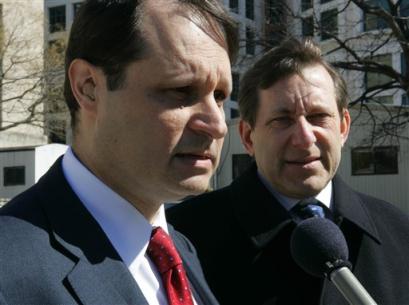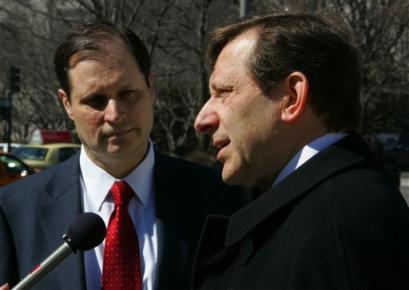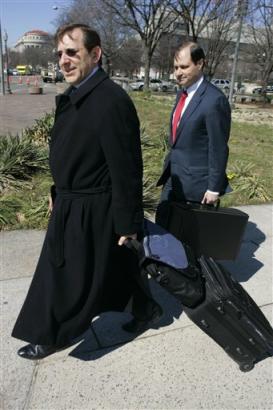|
השופטים לפרקליטי פולארד הוא לא מיוחד
פרקליטיו של פולארד הגיעו לבית משפט פדרלי לערעורים לדיון נוסף בבקשה לאפשר לו לערער על עונש מאסר העולם שנגזר עליו בגין ריגול למען ישראל. לטענתם, העונש הקשה שקיבל נובע משקרים של הממשל ומייצוג כושל של עורך דינו הקודם". שופט בית המשפט לערעורים: "הבעיה היא שמר פולארד חושב שהוא מיוחד... אם נקבל את הבקשה ייפתח סכר של בקשות נוספות"
איי.פי
עורכי דינו של ג'ונתן פולארד, שהורשע בריגול נגד ארה"ב, נתקלו בשאלות קשות כאשר טענו בפני בית המשפט הפדרלי לערעורים כי עונש מאסר העולם שנגזר על פולארד נבע משקרים של הממשל ומכשלון של עורך דינו הקודם לייצגו כהלכה.
השופט דיוויד סנטל מבית המשפט לערעורים רמז שטענותיהם של עורכי הדין חסרות תשתית ראייתית-משפטית מוצקה, ואמר כי אם היה מקבל את בקשתם להחיות שוב את התיק היה בעצם "פותח סכר" למאות אסירים נוספים שנשפטו לפני זמן רב.
"הבעייה עם מר פולארד היא שהוא חושב שהוא מיוחד", אמר השופט סנטל. "זה לא מקרה מיוחד", הדגיש. גם השופטת ג'ודית רוגרס שאלה האם פולארד, שהודה כי ריגל למען ישראל, זכאי למשפט חוזר.
"איננו יכולים לתת הוראות לנשיא ארה"ב"
עורכי דינו, אליוט לאואר וג'קובס סמלמן, ביקשו לקבל גישה למסמכים מסווגים של הממשל, שלטענתם יחזקו את בקשתם להעניק לו חנינה. אולם השופט סנטל אמר כי לבית במשפט אין סמכות להתערב בנושא זה. "איך אנו יכולים להורות לנשיא המדינה לנקוט פעולה בתהליך הזה?", שאל סנטל.
עורכי הדין טוענים כי פולארד הודה בסעיף אחד של ריגול, כיוון שחשב שהממשל האמריקני יתמוך בעונש קצר עבורו. מה שהוא קיבל במקום, היה עונש מלא על ידי ממשלו של רייגן שסייע לשכנע את השופט לשלוח אותו למאסר לשארית חייו.
פולארד, בן 50, הורשע בהעברת סודות צבאיים מארה"ב לפני 19 שנה. בשנים האחרונות טוען פולארד שעורכי דינו לא יצגו אותו כראוי ולא הגישו ערעור במועד. בשלב מסויים הוא האשים את ממשלת ישראל בקשירת קשר למנוע את יציאתו לחופשי.
ביוני 2004 , נעתר בית משפט בארצות הברית לבקשתו לערער פעם נוספת על מאסר העולם שהוטל עליו. אז נקבע כי הדיון בעניינו ייערך בעוד מספר חודשים.
(15.03.05, 21:57)
הדיון המשפטי בעתירתו של פולארד למשפט חוזר הסתיים ללא החלטה
15/03/05 23:12
הדיון המשפטי בעתירתו של יונתן פולארד למשפט חוזר הסתיים ללא החלטה. השופטים צפויים לפרסם את החלטתם תוך מספר חודשים.
מקורביו של פולארד דיווחו כי השופטים היו קצרי רוח, ואפילו לא אפשרו לעורכי הדין של פולארד למצות את עשר הדקות שלהם. בוועד למען השבת פולארד אמרו כי העובדה שישראל שוב לא שלחה נציג רשמי מטעמה להיות נוכח בדיון היא שאפשרה לשופטים להתנהג בצורה מזלזלת כל כך. "אם ישראל אינה דואגת להראות אם היא חושבת שנעשה כאן חוסר צדק לסוכן שלה, מדוע שהשופטים האמריקנים יעשו זאת במקומה", אמרו נציגי הוועד.
http://www.nrg.co.il/online/1/ART/884/029.html
בית
משפט
אמריקני
נוטה לדחות
עתירותיו של
ג'ונתן
פולארד
בדיון
שנערך אמש
אמרו שלושת
השופטים כי
אין בסמכותם
לפסוק
בבקשותיו של
פולארד; "פולארד
חושב שהוא
מיוחד", אמר
אחד השופטים;
פולארד לא
הופיע לדיון,
אשתו, אסתר,
ישבה בשורה
הראשונה
מאת:
עומר כרמון |
עודכן: 18:30 16/03/2005
http://www.nfc.co.il/archive/001-D-66440-00.html?tag=20-02-09
בית
משפט
אמריקני
לערעורים
נוטה לדחות
את עתירותיו
של המרגל
למען ישראל, ג'ונתן
פולארד,
בבקשתו
למשפט חוזר
ולקבלת גישה
למסמכים
מסווגים.
בדיון
שנערך אמש (ג',
15.3.05) אמרו שלושת
השופטים, כי
אין בסמכותם
לפסוק
בבקשותיו של
פולארד. "פולארד
חושב שהוא
מיוחד", אמר
אחד השופטים.
פולארד לא
הופיע לדיון.
אשתו, אסתר,
ישבה בשורה
הראשונה.
השופטים
סירבו לקבל
את טענות
עורכי דינו
של פולארד, כי
הפרקליט
שיצג אותו
לאחר שנשפט,
ריצ'ארד
הייבי (שנשכר
על-ידי ישראל),
התרשל בצורה
בלתי סבירה
ונמנע אפילו
מלהגיש טופס
בן דף אחד
שמוגש על-מנת
להקנות
לנאשם זכות
ערעור - בשל כך
נאלץ פולארד
להיאבק על
זכות זו כבר 16
שנה.
פולארד
מיצה עד כה
ללא הצלחה
כמעט את כל
הליכי
הערעור
המוקנים לו
על-פי החוק
האמריקני.
לפני למעלה
משנה נדחתה
בקשתו למשפט
חוזר, אך
עורכי דינו
החליטו
לפנות לבית
המשפט
לערעורים
בתביעה להקל
בעונשו.
פולארד
(50) שימש אנליסט
ביחידת
מודיעין של
הצי
האמריקני
בוושינגטון.
בשנת 1984 החל
להעביר מידע
מסווג
לישראל. נעצר
בחודש
נובמבר 1985 בעת
שניסה לבקש
מקלט
בשגרירות
ישראל בבירה
האמריקנית.
המרגל
למען ישראל
תובע לעיין
במסמכים
הסודיים
שהביאו
להרשעתו,
ובהם התזכיר
שהגיש לבית
המשפט, שר
ההגנה
האמריקני
לשעבר, קספר
וינברגר.
פולארד
טוען כי
התביעה
במשפטו
הראשון
הונתה אותו
וכי שוכנע
להודות
באשמה
בעיסקת
טיעון, תוך
כדי הבטחה
שהתביעה לא
תדרוש להטיל
עליו מאסר
עולם, אולם
הבטחה זו
הופרה. במידה
ואכן יידחו
עתירותיו של
פולארד,
בכוונתו
לפנות לבית
המשפט
העליון.
נוצר
ביום:
16/03/2005
סוכנות
AP פרסמה
תמונות של
עורכי דינו
של יהונתן
פולארד
בצאתם
מהדיון



Judges challenge Pollard attorneys By Matthew E. Berger
in latest legal move toward clemency
WASHINGTON, March 15 (JTA) — A U.S. federal appeals court appears unwilling to give lawyers for Jonathan Pollard access to classified information they say would help in their appeals for clemency for the former U.S. Navy intelligence analyst, who is serving life in prison.
In oral arguments at the U.S. Court of Appeals for the District of Columbia Circuit on Tuesday, members of the three-judge panel repeatedly questioned whether the court could let Pollard’s attorneys see classified information for a clemency petition, suggesting it was outside the judicial process.
The court also seemed poised to rule against Pollard’s other motion, to seek a new sentencing hearing because of ineffective counsel, saying Pollard is asking for provisions beyond the normal appeals process.
“I think that’s a problem with Mr. Pollard’s litigation,” said a visibly frustrated Judge David Sentelle. “He thinks he’s unique.”
The appeals hearing is the latest in the battle to free Pollard, who was sentenced in 1987 after pleading guilty to spying for Israel.
Pollard’s attorneys and members of the American Jewish community lobbied hard for Pollard’s clemency during the Clinton administration as well as previous administrations.
They argued that his life sentence was unjust because he had pled guilty and that it was harsher than sentences of other convicted spies who had worked for countries that were not allies of the United States.
If this appeal is denied, Pollard is likely to petition the U.S. Supreme Court to hear the case.
The Pollard case has captured the attention of Jews worldwide for nearly 20 years. Israel, which granted Pollard citizenship in 1995, has also raised the issue with successive American administrations.
On Tuesday, the Israeli Knesset passed a resolution demanding that the Israeli government make the United States releasing Pollard a condition for Israel’s freeing more Palestinian prisoners
In court here on Tuesday, Sentelle questioned the court’s jurisdiction from the first moment Pollard attorney Eliot Lauer began arguing to declassify 40 pages of a declaration written in 1987 by then-Secretary of State Casper Weinberger, which outlines his assessment of Pollard’s damage to U.S. interests and is believed to be key to Pollard’s long sentence.
Lauer said he needs access to the documents to assist the executive branch in determining Pollard’s clemency claim.
With access to the information, he said, “we may be able to show that with the passage of time, the harm that may have been attributed to Pollard is not attributed to Pollard, and may be attributed to other spies.”
Sentelle said there is no precedent for granting access to documents for the purpose of clemency, despite a protective order that allows Pollard’s attorneys access if they can show a “need to know” and proper security clearance to review the documents.
Pollard’s attorneys have gotten the security clearance.
Mary McCourt, the assistant U.S. attorney in the case, suggested the protective order was not applicable for furthering the quest for clemency. “There is simply no right in the furtherance of clemency petitions for discovery, for hearings,” she said, calling clemency a “plea for mercy” rather than a formal appeal. She also said those reviewing the clemency — the president and executive branch officials — could gain access to the materials, and there is no need for the prisoner’s attorney to have access.
On the sentencing issue, Jacques Semmelman, another Pollard attorney, said a conflict of interest between Richard Hibey, Pollard’s original attorney, and Hamilton Fox III, who filed a motion in 1990 seeking a withdrawal of Pollard’s guilty plea, prevented Fox from claiming ineffective counsel.
“The conflict of interest is that Mr. Fox could not bring himself to say anything negative about Mr. Hibey,” Semmelman said, after being asked repeatedly by Sentelle.
The new lawyers claim Hibey was ineffective because he did not appeal after Pollard received a life sentence, despite having pled guilty and cooperated with the government.
But Sentelle seemed not to accept Semmelman’s argument, saying he did not show a true conflict of interest.
He also said the attorneys’ claims of Hibey’s ineffectiveness were subjective, calling Hibey “eloquent,” “excellent,” and “one of the most prominent defense lawyers.”
While Sentelle was more vocal, Judge Judith Rogers also questioned the attorneys, and seemed to echo Sentelle’s concerns. Judge Karen Lecraft Henderson did not speak.
Pollard, who is serving his sentence in Butner Prison in North Carolina, did not attend the hearing. The last time he appeared in court was in Washington in September 2003 for a hearing on the same matter by the U.S. District Court. That court rejected the motions, prompting this appeal.
Pollard’s wife, Esther, sat in the front row of the courtroom.
“The clemency issue is an adversarial process,” she told JTA after the hearing. “How can you say it is fair for the government agencies to access the documents 24 times, but Jonathan’s lawyers are not allowed to see the documents?”
The court is expected to rule later in the year. If the appeals are denied, Pollard could ask the U.S. Supreme Court to hear either or both of the two issues.
If the appeals court rules for Pollard, he could potentially receive a new sentencing hearing or his attorneys could gain access to the classified material, or both, depending on the decision.
Sentelle suggested that Pollard would be able to exercise relief through the parole process.
Pollard is eligible for parole, but his attorneys said he has not sought a parole hearing because it would be hard to argue for parole without the classified information.
“Obviously, if parole were the solution, we wouldn’t be here today,” Esther Pollard said.
_________________
|


